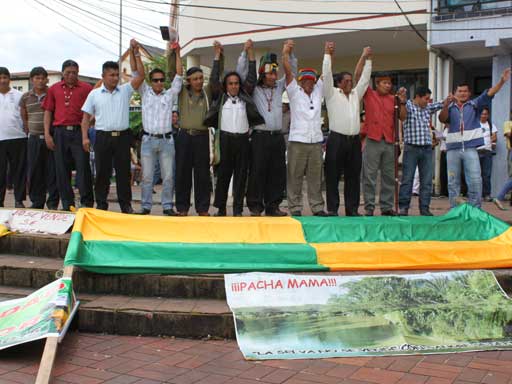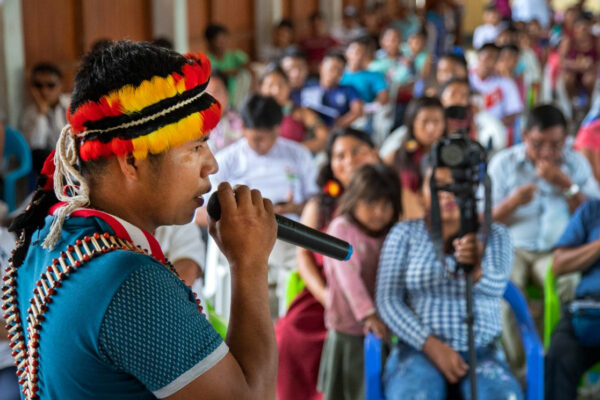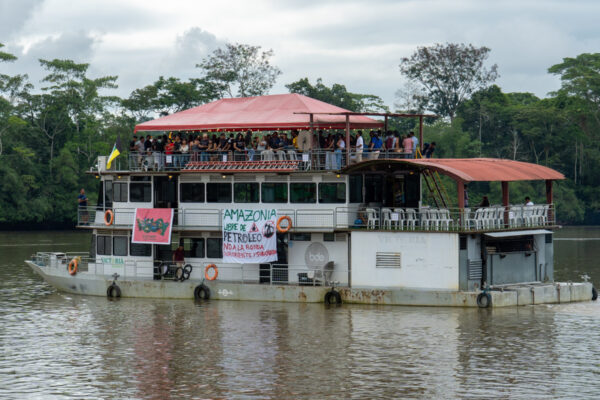Photos of the mobilization available upon request
Puyo, Ecuador – Amazonian indigenous leaders mobilized today in the regional capital of Puyo to oppose the Ecuadorian government’s attempts to close bids on eight million acres of its pristine southeastern Amazon. The region is Ecuador’s last remaining tract of virgin rainforest and is home to seven indigenous nationalities. Attempts to lease it have been plagued by a transnational oil spill, global protests, and wary investors.
Nationalities from the proposed oil blocks, the Confederation of Indigenous Nationalities of Ecuador (CONAIE), and the Confederation of Amazonian Indigenous Nationalities of Ecuador (CONFENIAE) gathered in the central square of Puyo to oppose the auction that would devastate their communities and their way of life. Franco Viteri, President of CONFENIAE, declared that the nationalities were on alert and would not rest until the oil round was cancelled. He also stated they were willing to mobilize further if needed. Past indigenous mobilizations deposed several sitting presidents and derailed free trade agreements. In a declaration the nationalities promised that they would exercise their constitutional right to “firmly resist any oil companies that try to enter our territories.”
At the launch of the round in November nearly twenty companies including BP, Andes Petroleum, Schlumberger, Repsol, ENI, Pacific Rubiales, and the state oil companies of Peru, Colombia, Mexico, Chile, Turkey, Vietnam, Belarus, Indonesia, and China expressed interest. However, indigenous opposition has given many companies cold feet and has forced the government to delay the round.
The auction’s opening in November was met with fierce protests in Quito, and global protests against the round have garnered international media attention from The Guardian, The Wall Street Journal, Le Monde, and dozens of other publications (including the largest papers in Ecuador). NBC‘s Ann Curry traveled to Ecuador to profile the oil round, and Avaaz.org gathered over a million signatures against the new attempt to drill in the Amazon.
“They should follow the principle of not repeating [past mistakes]”said Jose Gualinga, President of the Kichwa de Sarayaku, a community that on July 25th will be celebrating its landmark legal victory at the Inter-American Court of Human Rights (IACHR). That is the deadline by which the Ecuadorian government has to apologize to the community for allowing oil companies to operate on their land without their consent, which is exactly what the government is attempting to do with the current oil round.
While the government claims that the round has had “massive citizen participation,” yesterday Fundación Pachamama released a study that shows that only 7% of people who would be impacted by the round were even consulted. According to CONFENIAE, the minimal consultation that the government carried out has been full of co-option, bribery, and division, and has consistently violated the internationally recognized standard of Free Prior and Informed Consent (FPIC) that the Kichwa de Sarayaku vs. Ecuador case established.
In Fall 2012, partly due to their loss at the IACHR, the Government of Ecuador was forced to remove five of the most controversial oil blocks from the original tender. In March, it reduced expectations even further by stating that it was expecting bids on only six to ten oil blocks (down from the original 21). In late April, presumably because it had not received enough interest from potential bidders, the government announced that it was extending the deadline for companies to offer bids from May 31st to today. Two days later, Wilson Pastor, the minister who was in charge of the oil round, announced his resignation.
Last month, Ecuadorian President Rafael Correa was forced to issue an apology for an oil spill that wreaked havoc on communities and ecosystems throughout the Amazon Basin. The 420,000-gallon spill flowed downstream to Peru and has impacted at least 32 indigenous communities in the Amazonian province of Loreto, prompting the Peruvian government to threaten legal action. Brazil, worried that the spill will reach its border, alerted its navy, and Ecuador hired U.S. company Oil Spill Response to test for contamination in Brazil and Colombia. The spill serves as a stark reminder that Peru is subject to downstream contamination from any spill in Ecuador, as the headwaters of the Amazon begin in Ecuador and flow through Peru, and in some cases, into Brazil and Colombia. There is an oil spill every week in Ecuador, a sobering statistic that raises questions about company standards in Ecuador’s oil patch, and the ability or willingness of government institutions to oversee and ensure compliance of best oil field practices, none of which bodes well for the country’s largest expansion of its hydrocarbon sector in recent history.
All of these setbacks have led some analysts to predict that Chinese companies may be the only ones that will dare to bet on the controversial blocks. While Chinese law would outlaw its participation in the round, China has loaned Ecuador over $7 billion dollars and the terms of the loans require that Ecuador repay China in oil. Just in the past week China has agreed to help finance a $12 billion refinery on Ecuador’s coast and Ecuador has requested another $1.4 billion loan.
Last year Business Insider reported on a secret deal between Petrochina and Ecuadorian state oil company Petroecuador. The letter, which both companies signed in 2009 but only came to light in 2012, has a “sovereignty immunity waiver” that allows China to seize many of Ecuador’s assets if the country fails to repay the loans. This appears to include assets from oil companies operating there. “In addition to weekly oil spills, a shoddy consultation process, and massive resistance that will paralyze operations in indigenous territory, companies should be concerned with the scary fact that their assets could be seized by China if Ecuador doesn’t meet its obligations,” said Adam Zuckerman, Human Rights and Environmental Campaigner at Amazon Watch.














